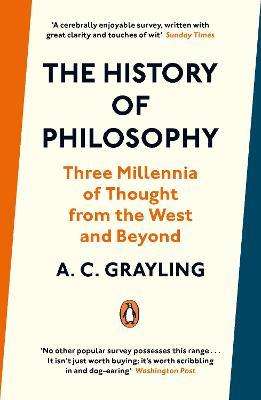Among the books bought during the summer was A.C. Grayling’s A History of Philosophy. It will probably not be read until next summer when the long Irish summer holidays offer the quietness and leisure to engage with Grayling’s presentation of the thinkers and their their thought.
Published by Penguin, it is a book with a cover that is aesthetically pleasing. Penguin Books have always seemed attractive. There has often been a temptation to buy copies of vintage Penguin books, no matter their condition, not for the purpose of reading them, but to have their distinctive spines among the books on the shelves.
Perhaps it is the visual dimension of the book that caused me to recoil from lines on the front cover quoted from a review of the book in the Washington Post.
So, let me say that “A History of Philosophy” isn’t just worth buying; it’s worth scribbling in and dog-earing. For a work of scholarship, there can be no higher praise.
Scribbling in? Dog-earing?
This is a seminal piece of writing, not a student textbook. Surely, one could keep a notebook for the odd notes that might be made? (Or the electronic equivalent for those who unlike me have moved on from the analogue world of pencil and paper).
Books are sacred, increasingly so. In contrast with the temporary, contingent, transitional world of the web, books have a solid permanence. Web pages are amenable to revision, to removal, sometimes to a complete re-writing. Books are not susceptible to passing whims and fashions, they sit stolidly on shelves, unchanged by the passage of time.
There will be future generations who will grow up with no understanding of how much books meant to their forebears, with no concept of how books changed the world, with no appreciation of how democratic societies owed their existence to ideas written and published in books.
It would sound strange to many now that there were mechanics’ institutes where working men might go to the reading room and that the Workers’ Educational Association was a major factor in the improvement of the lives of countless people.
Will future generations completely miss the experience of having books that were important influences in their lives, of having books that were precious to them? Will the idea that a book could express something of its owner be lost forever?
Catalan writer Carlos Ruiz Zafón captures a sense of the special nature of books in his novel Shadow of the Wind with its ‘Cemetery of Forgotten Books.’ There are books that can be somehow part of their owner There is something deeply sad in a much-loved book being separated from the person who for years had cherished it.
Scribbling in? Do-earing? Not in my copy.
